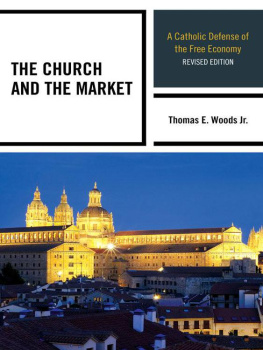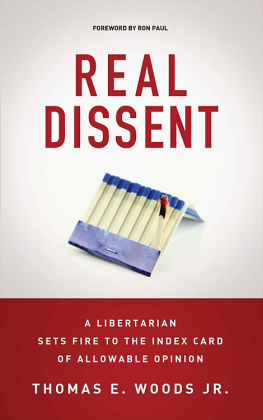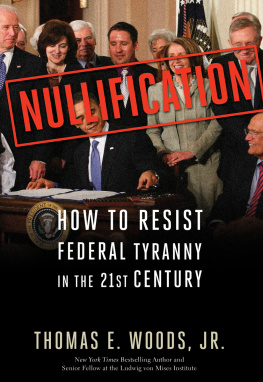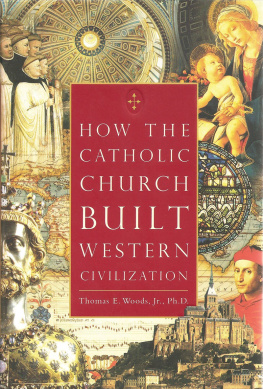Thomas E. Woods Jr. - Beyond Distributism
Here you can read online Thomas E. Woods Jr. - Beyond Distributism full text of the book (entire story) in english for free. Download pdf and epub, get meaning, cover and reviews about this ebook. year: 2012, publisher: Smashwords Edition, genre: Politics. Description of the work, (preface) as well as reviews are available. Best literature library LitArk.com created for fans of good reading and offers a wide selection of genres:
Romance novel
Science fiction
Adventure
Detective
Science
History
Home and family
Prose
Art
Politics
Computer
Non-fiction
Religion
Business
Children
Humor
Choose a favorite category and find really read worthwhile books. Enjoy immersion in the world of imagination, feel the emotions of the characters or learn something new for yourself, make an fascinating discovery.

- Book:Beyond Distributism
- Author:
- Publisher:Smashwords Edition
- Genre:
- Year:2012
- Rating:5 / 5
- Favourites:Add to favourites
- Your mark:
- 100
- 1
- 2
- 3
- 4
- 5
Beyond Distributism: summary, description and annotation
We offer to read an annotation, description, summary or preface (depends on what the author of the book "Beyond Distributism" wrote himself). If you haven't found the necessary information about the book — write in the comments, we will try to find it.
Beyond Distributism — read online for free the complete book (whole text) full work
Below is the text of the book, divided by pages. System saving the place of the last page read, allows you to conveniently read the book "Beyond Distributism" online for free, without having to search again every time where you left off. Put a bookmark, and you can go to the page where you finished reading at any time.
Font size:
Interval:
Bookmark:
Beyond Distributism
Thomas E. Woods, Jr.
Christian Social Thought Series
Copyright 201 by Acton Institute
An imprint of the Acton Institute for the Study of Religion & Liberty
Edition License Notes
This ebook is licensed for your personal enjoyment only. This ebook may not be re-sold or given away to other people. If you would like to share this book with another person, please purchase an additional copy for each person you share it with. If you're reading this book and did not purchase it, or it was not purchased for your use only, then you should return to Amazon .com and purchase your own copy. Thank you for respecting the author's work.
CONTENTS
I .
II .
III .
I V .
V .
V I.
Nostalgia is a useful and dangerous thing. At its best, it connects us to the past, providing a sense of community over time and guarding against what C. S. Lewis called chronological snobbery. Less helpfully, it can lead to mythologizing the past and blind us to the advantages of the present.
The ongoing appeal to Catholics of the economic arrangements called distributism and corporatism manifests in some cases the harmful form of nostalgia. In response, Thomas Woods pares away the inaccuracies of economic history that have accumulated over the last hundred years. Never does he call into question the good will of those who advocate older or more ideal forms of economic organization. Instead, he argues that the kinds of economic reform explicitly or implicitly promoted by the various defenders of distributism are imprudent. They would not further the ends that all devotees of Catholic social teaching share: wide ownership of property, service of the common good with particular attention to the poor, and a right ordering of the use of material goods.
Woods critique thus encompasses theology, history, and economics as he clarifies the Churchs teaching on social affairs, punctures common assumptions about precapitalist economies, and bracingly defends contemporary market arrangements against Catholic detractors. The details are debatable: Faithful Catholics may disagree with his assessment of the benefits versus the liabilities of capitalism, his portrayal of the guilds, or his judgment concerning the Industrial Revolution.
We should clearly understand, however, that Christian revelation does not demand one or another position on these issues. Instead, we are engaged in a common quest for the truth, a search that on most matters will not be definitely concluded until Christs kingdom is fully realized. Political theory, economic science, and history can all contribute to that search. None of these can be pitted against revelation. Instead they must be approached sympathetically yet critically so as to enhance our understanding of how best to achieve a society conducive to the gospel message of charity and justice.
In this cause, Thomas Woods makes a persuasive case for the wisdom of looking to a model other than distributism as we consider the best route to Christian participation in the world.
Kevin Schmiesing
Acton Institute
* * * * *
I
When the Berlin Wall fell and the Soviet empire began to collapse, decent people everywhere rejoiced. The captive nations were breaking free, an outcome hardly anyone expected to live to see. Statutes of their tormentors came crashing down, and the communist emblem was torn out of national flags.
There were intellectual consequences as well. Among the clearest was this: Central economic planning was dealt a mortal blow and was widely discredited around the world. The free market, which had been far less intellectually fashionable those seven decades, had triumphed.
In recent years, there has been a minor revival of interest in a so-called third way between socialism and capitalism. Beyond Capitalism and Socialism , a new collection of essays by Catholics, is a good example of the phenomenon. The gist of such efforts runs something like this: Although socialism was indeed discredited following the collapse of the centrally planned economies of Eastern Europe, we must not assume that the free market is the only remaining alternative. The market has problems of its own.
Over the years, detractors have identified a variety of problems with capitalism, confusingly shifting the focus of their critique. First, critics claimed that the market produced too little wealth for the masses and enriched only a select few. Then they argued that the market produced too much wealth and made the masses materialistic and fat. Another complaint about the market was its alleged tendency to concentrate wealth and property in the hands of the few, leaving the great bulk of humanity propertyless and vulnerable.
Distributism, a school of economic thought made popular by early twentieth-century British Catholic authors Hilaire Belloc and G. K. Chesterton, made much of this latter point. Distributism was a variant of corporatism, a system of political economy born in the wake of the French Revolution that sought the resurrection of various corporate bodies, such as the guilds, that the revolution had suppressed. Corporatists sought to manage economic competition, which they viewed as destructive and destabilizing, by grouping occupations into self-regulating trade associations and granting the central state a supervisory and coordinating role over business and labor.
According to distributists such as Chesterton and Belloc, the unhampered market led to radical economic inequality and the dispossession of the vast majority of the people who lacked productive property and had to rely for their sustenance on the good will of employers. They were wage slaves. Furthermore, so-called cutthroat competition destroyed small competitors and led to monopoly.
According to distributists, this injustice might be redressed by a return to the less individualistic medieval economy. Then, productive property was widely distributed, guilds kept competition in check, and the poor and vulnerable were better cared for. International trade was more limited, and production for local use predominated.
The arguments offered in defense of this system, while perhaps superficially plausible, turn out to be based on logical and economic fallacies, as well as on a serious misreading of European history. Distributists blame widespread indebtedness on the free market instead of on central banks (which are creations of government ) that make credit artificially cheap and thus all the more tempting. The medieval economy that distributism holds up as a model bears little resemblance to the medieval economy as professional historians and economists have come to understand it. There was far more long-distance trade and far less local self-sufficiency in medieval Europe than the distributist version of history allows. Land ownership was not widely dispersed under the feudal system, and neither was ownership of the means of production. Even urban workers outside traditional feudal bonds often did not own the means of production. Peasants labored exhausting hours and barely made ends meet even with all members of their families working. The guild system, far from being a liberating force, was actually the source of true monopoly and exploitation.
Distributists hold up their understanding of the economy of the European Middle Ages as a model toward which we are to return, even though, as we have just seen, such a model never existed in the first place. Although not all distributists are Catholic, many are, and many contend that distributism is required by Catholic social teaching and is a superior form of economic organization.
Neither claim is true.
Distributists also repeat a longstanding leftist critique of the market: the so-called capitalist paradox. This alleged paradox involves a conflict between two trends encouraged by the market: ever-geater production on the one hand, and ever-lower wages on the other. Thus, while more and more shoes are produced, workers can afford fewer and fewer of them. As we shall see, no such paradox exists.
Next pageFont size:
Interval:
Bookmark:
Similar books «Beyond Distributism»
Look at similar books to Beyond Distributism. We have selected literature similar in name and meaning in the hope of providing readers with more options to find new, interesting, not yet read works.
Discussion, reviews of the book Beyond Distributism and just readers' own opinions. Leave your comments, write what you think about the work, its meaning or the main characters. Specify what exactly you liked and what you didn't like, and why you think so.











